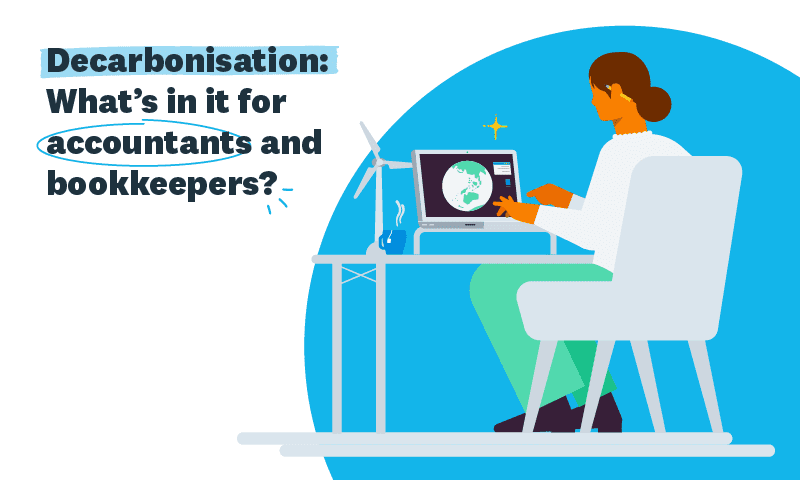
Decarbonisation: What’s in it for accountants and bookkeepers?


As many of us continue to respond to the impacts of climate change, it’s important to consider how the small business landscape will change, not just for our small business customers but our accounting and bookkeeping partners too.
When Xero was founded in 2006, we were just at the beginning of what was to become the new era of accounting, in the cloud. The potential benefits of the cloud were exciting and a source of much curiosity for accountants and bookkeepers. Today, it feels like we’re at a very similar stage of the adoption curve when it comes to small business sustainability. Now that many firms have embraced the cloud and are reaping the benefits, topics like carbon emissions, waste and water management, and electric vehicles are now woven into conversations with colleagues and clients.
While these aren’t new ideas, they are fast becoming an important consideration for small businesses. Who do small businesses go to when they have questions? In many instances it is their advisor. In a Xero study undertaken in 2021 we found that 68% of small businesses want to improve their sustainability practices, but many don’t know where to start.
What’s driving this?
We’re seeing governments and corporations set targets to decarbonise over the next decade. This has a flow on effect to legislation with governments signalling an increase in future compliance for medium and large businesses. The upshot for small businesses is to potentially expect higher thresholds for access to lending and government grants, and the need to demonstrate sustainability efforts to participate in corporate supply chains.
Employee demand for better sustainability performance is growing with 69% of employees saying they’re more likely to work for organisations they consider to be environmentally sustainable. While many consumers are voting with their wallets, 71% of those who think traceability is important are willing to pay more for brands that provide it, and 57% saying they would change their shopping habits to reduce their environmental footprint.
This is where you as a trusted advisor can play a pivotal role in supporting your clients through this transition. Small businesses are time poor, opportunity rich, and tasked with endless jobs to do every day. In the same way they lean on you for support in understanding their financial performance, sustainability is becoming an integrated part of running a business, which they may start to require support and advice on.
What are the opportunities?
There are two sides to the opportunity here. For your firm, prioritising sustainability can help to reduce your carbon footprint, attract and retain staff, as well as giving clients another reason to choose you as their advisor.
There’s no shortage of frameworks, resources, reporting standards and initiatives to help guide your sustainability efforts. Understanding the role of each of these things requires a certain level of expertise and big-picture understanding. Exactly the kind accountants and bookkeepers develop over years of experience, education and professional development.
The other opportunity is the tangible value you can add for your clients in helping them measure, manage, report on and mitigate their own sustainability footprints. A great example is found in the growing number of certifications and assurance requirements. As financial professionals, your skills in data collection, verification, assurance and audit can be applied to the carbon certification space.
Small businesses are also considering the technology, tools and suppliers that can help them operate more sustainably. From measuring and managing their carbon footprint, to choosing ethical and environmentally responsible energy providers, there are many ways you can guide your clients on making more sustainable choices that benefit their business.
This presents a great opportunity to add value to your clients’ businesses in new ways, and add new service lines. Many of these actions are likely to save your clients money, so you can do good for the planet and improve their business’ bottom line at the same time.
What are others already doing in this space?
Here are some of the types of sustainability-related services we’ve seen:
- Sustainability audits: An all-round assessment of a client’s operations for opportunities for improvement. The usual suspects are energy suppliers, consumables (for example, cups, bags, tape, boxes, printing, catering, and water and energy use or waste).
- Supply chain assessments: A review of a client’s top suppliers to see if there are less expensive and more sustainable options.
- Fleet transition support: While a nascent space, moving from internal combustion engines to electric vehicles can have a positive impact on the planet.
- Carbon measurement, management, offsetting, auditing and certification: Another burgeoning space that is similar in process to financial audits, where you can use business data to identify opportunities for more sustainable decisions and operations.
- Active Transport policy support: Helping your clients to develop employee benefits like subsidised public transport, and providing end-of-trip facilities not only benefits the planet, but can also help increase employee engagement.
CAANZ, CPA, ACCA, ICB, and Prime Global have all released their own sustainability or Environmental, Social, and Governance (ESG) education resources, and are actively helping their members navigate this new space. We recommend engaging with your professional body to see what the other learning opportunities are.
Interested and want to get started?
Here are some things you can start doing from today:
- Find like-minded practitioners and start building your community with them
- Upskill with courses and self-paced education
- Engage with your professional body to learn more
- Do something! Try it out, pilot a service with some interested clients, see what the response is, and remember you can always improve your offering over time.
Check out our sustainability hub to learn more about the sustainability opportunities and resources available for small businesses, accountants and bookkeepers. If you have any questions or suggestions please drop us a comment below.





